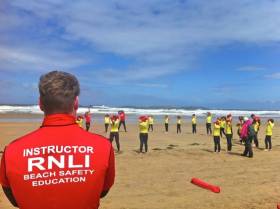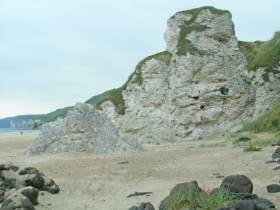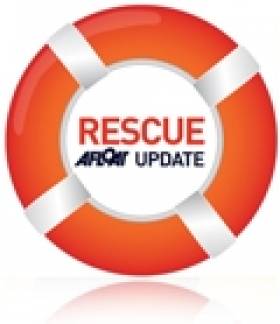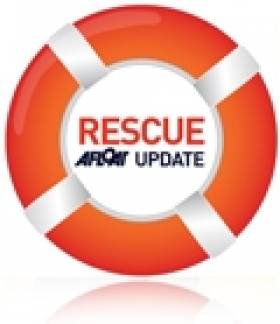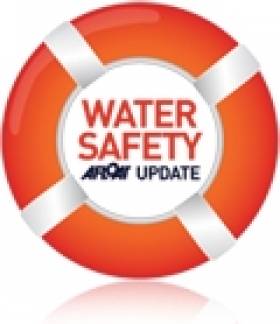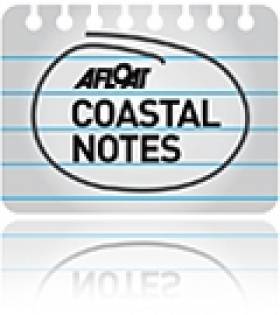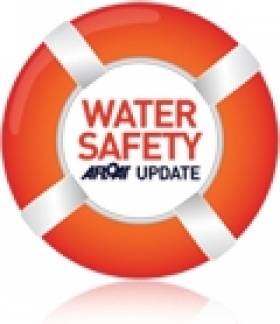Displaying items by tag: lifeguards
#Lifeguards - RNLI lifeguards are hitting the surf again and bringing their popular beach safety programmes to school children and youth groups in Northern Ireland.
Hundreds of children have already been through the programmes and learned valuable and important advice to keep safe in the water and along the shore, in a fun and interactive way.
Last summer 345,027 people visited the 10 RNLI-lifeguarded beaches on the Causeway Coast and in Co Down. Of these people 27,043 entered the water while 9,975 took part in surfing or other water leisure actives such as body boarding and kite surfing.
The lifeguards responded to 182 incidents, coming to the aid of 218 people. As well as rescues carried out in the water, lifeguards also dealt with falls, first aid and lost children.
The RNLI lifeguarding season has already begun on five beaches along the Causeway Coast and this cover will be extended for the peak summer season from Saturday 25 June through to Sunday 4 September.
In the run up to this and before schools break up for the summer, the RNLI is encouraging primary schools and youth groups to sign-up for its two beach safety education programmes.
The ‘Meet the Lifeguards’ and ‘Hit the Surf’ programmes teach young people the importance of beach safety in a fun and practical way.’
‘Meet the Lifeguards’ is an interactive session where RNLI lifeguards visit a school or youth group and teach the children key safety advice that they then put to use when they visit a beach with family and friends.
Children learn what the different beach safety flags and signs mean, the safety of using inflatables, the dangers of 'tombstoning', sun safety and how to identify natural and man-made hazards in and around the water. They will also learn about body boarding and surfing safety and how to escape a rip current. Information on tides and waves is included in the session.
The ‘Hit the Surf’ programme, meanwhile, offers a unique opportunity for school children or youth groups to get practical lessons in lifesaving and beach safety at one of the 10 RNLI-lifeguarded beaches located on the North Coast and in Co Down, or inland for the first time on the shores of Lough Erne in Cp Fermanagh.
The two-and-a-half-hour session includes a lesson on staying safe at the beach and explains the role of the RNLI and its lifeguards. It is followed by a lifesaving lesson and learning surf-based skills while building the children’s confidence in the sea. They will also learn about local hazards and the beach environment.
For more information on how to book your school onto an RNLI education programme in Northern Ireland, contact RNLI lifeguard supervisor Jenny Thompson 077 8992 4563 or email [email protected]
Portrush Lifeguard Aids Man Injured In Whiterocks Cliff Fall
#CliffFall - An RNLI beach lifeguard aided a man who fell onto rocks while walking a steep cliff path on Whiterocks beach in Portrush yesterday afternoon (Wednesday 30 March).
The call for help came after a member of the group the man was with observed him fall just before 1pm and raised the alarm.
After arriving on scene, senior RNLI lifeguard Jamie Russell immediately began to administer casualty care to the conscious man, who had fallen some 12 feet from the coastal path. He was joined on scene by a paramedic and they continued to provide assistance.
However with an incoming tide and a challenging location, it was decided that removing the casualty would require the assistance of Coleraine coastguard.
The man was secured on a stretcher and carefully moved by the group around the rocks to a waiting ambulance.
Commenting on the callout, RNLI lifeguard supervisor Karl O’Neill said: "This incident was quite a challenging one to respond to due to the nature and location of the fall.
"Thankfully the man was conscious but we did not want to risk any further discomfort or injury by moving him ourselves. I would like to thank members of Coleraine coastguard for their assistance."
Whiterocks is one of five beaches being patrolled by RNLI lifeguard during the Easter holidays, continuing till Monday 4 April, as previously reported on Afloat.ie.
RNLI Lifeguards Bring Season Beach Cover To A Close This Weekend
#Lifeguards - As RNLI lifeguards prepare to bring the 2015 season to a close this weekend in Northern Ireland, the charity that saves lives at sea has appealed to anyone planning a trip to the beach during the autumn and winter months to keep safe.
The season will draw to an end this Sunday 27 September, and RNLI lifeguard manager Mike Grocott is keen to remind anyone going to the beach post season to be aware that the lifeguards won’t be on patrol but that the same beach safety advice applies.
"While we can expect our beaches to be generally quieter in the coming months, there will be people using the water for activities such as surfing and kitesurfing.
"In the absence of RNLI lifeguards during this period, we would encourage anyone going to the beach to check weather and tide times, let someone know when you are due back, and carry a means of communication.
"If you see someone in trouble, please call 999 or 112 and ask for the coastguard. People can also get advice at their local RNLI lifeboat station."
During the 2015 season there was RNLI lifeguard cover on 10 beaches on the Causeway Coast and in Co Down: Benone, Downhill, Castlerock, Portstewart Strand, Portrush West, Portrush East, Whiterocks, Tyrella, Murlough and Cranfield.
Five of the busier beaches were patrolled during the Easter period and at weekends from then till the middle of June before the full time season commenced on all 10 beaches running to 6 September. Lifeguards have maintained a presence at the busier beaches at weekends during September and will finish on Sunday evening.
Reflecting on the season, Grocott said the lifeguards had dealt with a variety of incidents. "Despite the weather being unkind for most of the summer, we did see a lot of visitors to our beaches and RNLI lifeguards dealt with a range of things including rescues and major first aids involving body boarders, paddle boarders and kite surfers.
"They also responded to people who got into difficulty on the beach itself including a teenager who collapsed and a man who was struggling to breathe in his car.
"There were a number of unusual incidents to deal with this summer too, including responding to a sand dune fire, red flagging beaches in a severe thunder and lightning storm and dealing with the discovery of mortar bombs. Our lifeguards are highly skilled and trained and thanks to that they knew how to handle such incidents professionally when they occurred."
The lifeguards also provided safety cover and engaged with the public at key events during the summer including the Portrush Raft Race, the Tall Ships in Belfast, the Portrush Airshow, and the Glens of Antrim triathlon.
"We worked closely with our lifeboat crews at Portrush, Newcastle, Kilkeel and Red Bay, too, to respond to incidents and provide safety cover when required."
RNLI lifeguards also delivered education programmes to primary school children across Northern Ireland. Programmes such as Hit the Surf enabled the lifeguards to impart important beach safety advice through theoretic and practical lessons in lifesaving and surf-based skills, local hazards and the beach environment.
RNLI Lifeguards Assist Paddle Boarders On Whiterocks Beach
#Rescue - RNLI lifeguards assisted two stand-up paddle boarders on Whiterocks beach in Portrush on Saturday (11 July) during strong offshore winds.
Senior RNLI lifeguard Bosco McAuley spotted two people in difficulty at 3.40pm approximately 100 metres out to sea within the lifeguards flagged patrol zone on the beach.
The two women were both on stand-up paddle boards when they got caught off guard by a strong offshore wind. Weather conditions were described as overcast and windy at the time, with about 1-2 foot of surf.
After observing the situation, McAuley asked his RNLI lifeguard colleagues Bruce Traill and Ali Boyd to assist. Traill quickly put on his RNLI rescue watercraft kit while Boyd launched the jetski into the water.
McAuley then proceeded to the two paddle boarders and assisted them safely back to shore before going back to retrieve the two paddle boards.
"Offshore winds during the summer season can cause issues on the beaches, when these situations arise we are on scene and can quickly deal with them to ensure the public’s safety," said McAuley after the rescue.
RNLI supervisor Tim Doran added: "Anyone who gets into difficulty the water should try to remain calm, raise their arm and signal for help. Our lifeguards are well trained when it comes to spotting people in danger in the water and are quick to respond."
" With numbers on the beaches expected to increase for the July holidays this week, Doran reminded people to be mindful of the RNLI’s key safety advice – particularly for those planning to use the water.
"If you are planning on visiting a beach this summer, choose a lifeguarded beach and swim between the red and yellow flags, which mark the safest area to swim and are an indicator that lifeguards are on duty.
"If you see someone else in trouble in the water, call on the help of a lifeguard or dial 999 and ask for the coastguard."
'Suspicious Object' Retrieved By NI Beach Lifeguards
#Portrush - RNLI lifeguards on Northern Ireland's north coast who spotted a suspicious object in the sea on Thursday afternoon (2 July) recovered an old sofa that had been dumped in the water.
Senior lifeguard Bosco McAuley and lifeguards Bruce and Shane Traill were patrolling Whiterocks Beach in Portrush around 2pm on Thursday when they spotted something in the water 150m from the shore.
The lifeguards, who couldn’t tell what was in the water using their binoculars, immediately launched their rescue water craft and made their way to the scene to investigate.
Weather conditions at the time were very good as around 200 people were enjoying the sunshine on the beach.
The lifeguards soon discovered that the object was an old sofa which had been dumped into the sea. On recovering the item out of the water and away from public harm, the lifeguards proceeded to put the sofa on one of their trucks and safely disposed of it.
"While on one hand it might appear quite funny that we launched and recovered an old sofa from the sea, it is important to point out that our lifeguards, who are highly skilled and trained, acted in good faith responding swiftly when they noticed something unusual in the water," said RNLI lifeguard supervisor Tim Doran.
"We would always encourage visitors to the beach to alert us or phone the coastguard should they notice anything suspicious. We would always rather investigate the incident to find it is a sofa and all is well than not know and then discover too late that someone is in difficulty."
Doran added: "Our lifeguards will deal with a variety of incidents over the summer period and while I hope this will be one of the fewer types of instances, it does highlight the vigilance they show to keep our beaches safe."
Benone Strand Lifeguard Unit Vandalised Twice In A Week
#Benone - The RNLI beach lifeguard unit on Benone Strand on the North coast has been vandalised for a second time in a week.
During what is traditionally one of the RNLI lifeguard’s busiest weeks of the year, the charity’s lifeguards discovered on Wednesday morning (1 July) that vandals had damaged the exterior of the beach lifeguard unit for a second time within a week.
The railings around the exterior of the hut had been badly bent, a ventilation fan on the roof of the unit had been broken off, and fencing leading up to the unit that protects the surrounding dune system had also been broken.
The RNLI are working closely with the PSNI in an attempt to prevent further damage being done to the beach unit throughout the summer.
"It is estimated that repairs to the beach lifeguard unit will run into hundreds of pounds for the charity, as the railings, fencing and ventilation fan will have to replaced and fitted," said RNLI lifeguard supervisor Tim Doran.
"While our lifeguards are on duty many people come up to the units for assistance and advice and they are easily identifiable. We hope that these acts of vandalism will cease and that our lifeguards can continue to operate from them safely when carrying out their lifesaving work."
RNLI Lifeguards Rescue Man On Castlerock Beach
#RNLI - RNLI lifeguards rescued a man who found himself in difficulty on Castlerock Beach in Co Derry yesterday afternoon (Friday 3 July).
Shortly before 12.30pm, senior lifeguard Damian McCauley was assisting two vehicles that had got stuck in soft sand at the entrance to the beach when he heard a man call from one of the cars and wave for help.
The man, who was on his own in the car, was hunched over, struggling to breathe with his arms shaking, while his voice was hoarse and weak.
McCauley immediately ran for the lifeguard’s first aid responder bag and, using his training, began to deliver casualty care.
Meanwhile, lifeguard Beth Montgomery, who was acting as the communications liaison, alerted the coastguard and the Northern Ireland Ambulance Service.
Lifeguard Conor O’Callaghan ensured the beach, which had about 300 people visiting at the time and with 40 people in the water, remained open by patrolling between the red and yellow flags.
On monitoring the casualty’s breathing, McCauley observed that oxygen was required and, using the RNLI apparatus, proceeded to ensure the man got this. He continued to carry out casualty care while talking to the man for 25 minutes until the other emergency services arrived.
By that time the man had begun to respond to the oxygen and was then transferred from his car to an ambulance and brought to the Causeway Hospital in Coleraine.
Speaking following the rescue, RNLI lifeguard supervisor Tim Doran said: "We would like to wish this gentleman well and hope he makes a speedy recovery following his ordeal this afternoon.
"He managed to raise the alarm quickly when he found himself in difficulty today and thankfully our lifeguards were able to respond immediately and give him the medical attention he needed right away.
"This rescue is testament to the first aid training our lifeguards have and to the equipment we carry on the beaches which ensure we can deliver good casualty care."
Doran added: "Our lifeguards worked well together today to deal with the emergency, liaise with the other emergency services and keep patrol of the remainder of the beach.
"This incident is another example of how our lifeguards' vigilance is as important on the beach dealing with land-based incidents as it is when patrolling incidents that unfold in the water."
RNLI Lifeguards Deal With First Major First Aid Incident Ahead Of Summer Season In Northern Ireland
#WaterSafety - RNLI lifeguards commenced full-time summer patrol on 10 beaches in Northern Ireland at the weekend.
Following weeks of intensive training in preparation for the new season, the lifeguards will be keeping visitors safe on seven beaches along the Causeway Coast and three in Co Down.
The beaches include Benone, Downhill, Castlerock, Portstewart Strand, Portrush West, Portrush East, Whiterocks, Tyrella, Murlough and Cranfield.
Five of the busier beaches had lifeguard cover during the Easter period which was followed by a weekend patrol on six beaches throughout April, May and June.
During weekend patrol on Sunday 14 June, RNLI lifeguards on Portstewart Strand dealt with their first major first aid incident of the summer.
At around 4.30pm, lifeguard Mairead McKeague was on duty at the water’s edge and patrolling the area between the red and yellow flags when she spotted a teenage boy at the east of the beach who had slipped on rocks and hit his head.
McKeague alerted senior lifeguard Damian McCauley and lifeguard Clara Doran, who responded immediately while she maintained patrol of the beach.
Lifeguard James Shannon, meanwhile, acted as the communications liaison between the RNLI and their colleagues in the coastguard and Northern Ireland Ambulance Service who also responded.
On scene within five minutes, McCauley and Doran proceeded to carry out first aid and treat the casualty for a head wound. They were joined five minutes later by a NIAS Rapid Response Paramedic and the Coleraine Coastguard Rescue Team, who proceeded to transport the casualty to their vehicle.
Speaking following the incident, RNLI lifeguard supervisor Tim Doran said: "Our lifeguards worked well together, spotting the incident quickly, communicating with each other and reacting swiftly to administer first aid to the casualty.
"They used their lifeguard training and skills to good effect with this incident serving as an example of the vigilant work our lifeguards do in responding to events that happen on the beach as well as those that occur in the water."
From Saturday 20 June, the RNLI took up full-time daily duty on all 10 beaches continuing to Sunday 6 September, when weekend duty will then resume on selected beaches throughout September.
Lifeguards will be on the beach daily between 11am and 7pm on the Causeway Coast and between 10am and 6pm in Co Down.
Ahead of the new season, the RNLI has reminded visitors to the beach to ask the lifeguards for water safety advice, and to call on a lifeguard if they see anyone in difficulty.
RNLI lifeguard manager Mike Grocott also encouraged visitors to bear in mind some key safety messages.
"The RNLI’s advice for anyone planning a trip to the beach is to check weather and tide times before you go and if planning to go into the water, swim at a lifeguarded beach, between the red and yellow flags.
"Avoid using inflatables in strong winds or rough seas. If you get into trouble, stick your hand in the air and shout for help and if you see someone else in trouble, tell a lifeguard. If you can’t see a lifeguard, call 909 or 112 and ask for the coastguard."
Throughout the summer, the lifeguards will deal with a range of incidents.
"While the same safety advice applies to all our beaches, we do tend to see patterns of activity that are more specific to some beaches than others," said Grocott.
"Whiterocks, for example, is most affected by last winter’s storm damage and there is a lot of coastal erosion there. It is also a beach known for its waves and swells so it is popular with surfers and body boarders.
"Benone, Portstewart and Portrush East, meanwhile, are large beaches which we know will attract a lot of people throughout the summer. We can also expect to be exceptionally busy on vank holiday weekends, during the fortnight holiday period in July and if and when the weather peaks.
"Having a good knowledge of the profile of our beaches and the types of activities that are popular on each of them helps to guide how we carry out our lifeguard training before the season begins so our lifeguards can be prepared for all the incidents they will encounter."
#RNLI - RNLI lifeguards on the Causeway Coast helped to bring a sand dune fire under control at the weekend.
Lifeguards Jenny Thompson, Liam Mullan, James Walton and Jordan Burns were patrolling Benone Strand near Coleraine on Saturday afternoon (16 May) when, shortly after 3pm, they spotted smoke emerging from the sand dunes as they were preparing to enter the water to do some training.
One lifeguard went to investigate the incident some 400m from the rear of the lifeguard hut and observed a large fire which was spreading fast due to a strong easterly wind.
The lifeguards contacted the Northern Ireland Fire and Rescue Service before going to the scene themselves and bringing the fire under control within 10 minutes using fire extinguishers and shovels.
While continuing to maintain an operational and safe beach, the lifeguards ensured that no one was in any danger.
The lifeguards were assisted by staff from the nearby Benone tourist complex who provided the extinguishers, the beach rangers and some members of the Order of Malta who had been providing medical cover for a half marathon which had just finished on the beach.
RNLI senior lifeguard Liam Mullan explained: "The strong easterly wind was a big factor on how fast the fire was growing and how hot it was burning. Thankfully once on scene, we were able to bring the fire under control in about 10 minutes.
"Everyone reacted quickly and worked together using the water to contain the fire to stop it traveling with the wind. We then worked from behind the blaze using the wind to keep the smoke away from us. Using shovels, we brought the flames under control."
Speaking following the incident, Tim Doran, RNLI lifeguard supervisor, said: "While the primary role of a lifeguard is ensuring people’s safety in the water, they also have a duty of care for all members of the public when on land too.
"RNLI lifeguards have a good knowledge of beach access and the surrounding areas and we would encourage any concerned member of the public who comes across such fires to raise the alarm with the lifeguards on patrol who can respond and alert their colleagues in the fire service."
Lifeguards Return To Causeway Coast For Easter Break
#WaterSafety - RNLI lifeguards will be making a welcome return to a number of selected beaches on the Causeway Coast and in Co Down next weekend ahead of the Easter holidays.
After undergoing intensive training in preparation, the charity’s lifeguards will be keeping visitors safe on Tyrella Beach in Co Down and on Benone Strand, Portstewart Strand, East and West Strands in Portrush and Whiterocks on the Causeway Coast.
Lifeguards will begin their patrols on Good Friday (3 April) between 11am and 7pm on the Causeway Coast and between 10am and 6pm in Co Down and continue daily to Sunday 12 April.
Cover will be provided every weekend until the end of June ahead of the summer season, when a daily duty will get underway on all 10 RNLI lifeguarded beaches in Northern Ireland.
"Our lifeguards are looking forward to going on patrol and meeting people who come to the beach," said RNLi lifeguard manager Mick Grocott. "We would encourage visitors to speak to our lifeguards, ask for safety advice, and most importantly call on them should they find themselves in difficulty."
Ahead of Easter, the RNLI has reiterated its advice to people planning a beach trip to stay well away from dangerous cliff edges which have been impacted by recent weather conditions.
Winter storms changed the profile of all the beaches with extensive damage at Whiterocks, Portrush East and Portstewart where there are high and unstable sand cliffs.
The RNLI’s advice for anyone planning a trip to the beach is to: check weather and tide times before you go and if planning to go into the water; only go swimming at a lifeguarded beach, between the red and yellow flags; and avoid using inflatables in strong winds or rough seas.
If you get into trouble, stick your hand in the air and shout for help and if you see someone else in trouble, tell a lifeguard. If you can’t see a lifeguard, call 909 or 112 and ask for the coastguard.
For more safety information on the beach you plan to visit, you can download the RNLI’s Beachfinder app to find lifeguarded beaches and more information.


























